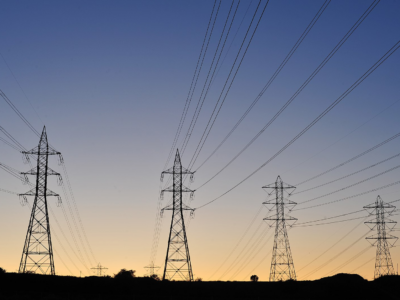Why Do Small Changes in Global Temperature Matter So Much?
One problem is that we’ve pursued optimization rather than robustness.
Scientists are warning us that even comparatively small changes in average temperature may have disastrous results. If you turn up your thermostat 2 ºC (about 3.6 ºF), the difference may be noticeable but it’s no big deal. So why is that a scary increase in global temperatures? Some reasons are physical, particularly the difference between being one degree below freezing versus one degree above. But another key reason is that we’ve finely tuned our society to a specific climate regime, which is abruptly changing.
In the natural world, there are generalists species that do pretty well in a wide variety of settings and specialist species that are finally tuned to a specific setting. Homo sapiens is a generalist species — but are our current physical and social infrastructure is finely tuned for a very specific climate regime. Climate change upsets the applecart, disrupting entrenched adaptations to the physical world.
In economic theory, people have a gift for taking all the available data, crunching the numbers, and coming up with the optimal course of action. As most economists would admit these days, this is only an approximation. Both parts of this matter: people optimize but have blind spots. It’s easy to see from, say, responses to the COVID pandemic, that people can sometimes be quite irrational, particularly when faced by something unfamiliar that they have trouble grasping.
What I want to focus on, however, is the way that economic theory is right, and why that’s a problem. The fact is that we optimized for a climate that no longer exists, carefully avoiding investment in precautions that would have been inefficient at that time. This optimizing includes where we put our cities and how we designed our infrastructure. It also affected decisions over long periods of time about where to live and how many children to have.
If we had been optimizing to the new climate from scratch, we would have spent more money on infrastructure; settlement patterns would have been different; cities would have been located further from sea level; and our current population might be lower given the need to grow food in more challenging weather.
In other words, we created societies and infrastructure that were finely tuned to the wrong situation. We also assumed climate stability with physical and social infrastructure that is very difficult to change, ranging from dam construction to property law systems.
Climate change puts us in the position of companies that optimized inventory costs with just-in-time reliance on China, only to see the system collapse during COVID. By nature, human beings are an adaptable, generalist species. But we’ve created a situation where we’ve adjusted everything to live in a very specific climate.
It’s a truism among disaster experts that efficiency is the enemy of resilience, because resilience requires that you sacrifice immediate optimality to hedge against the unexpected. By optimizing so well, we’ve put ourselves in a position where our resilience is low. Ultimately, our adaptability as a species will help us out, but the adjustment period could involve not only rebuilding a lot of infrastructure (and building a lot of new infrastructure), but also moving hundreds of millions of people from one part of the world to another. As you may have noticed from the political fallout from much lower levels of immigration here and in Europe, such population shifts do not take place easily.
And of course, there’s another complication about human beings, which is that we are very imperfect cooperators. If you have any doubts about that, consider how little progress international negotiators have been able to make toward a sensible global climate policy – say a uniform carbon tax. So it’s going to be a very messy process to accomplish anything that requires large-scale cooperation, whether that’s admitting millions of climate refugees into a country, spending billions on flood control, or agreeing on how to divide up increasingly variable water resources.
In short, even assuming that the climate stabilizes at (say) 2 ºC and that we’re eventually able to successfully adapt to that, it’s likely to be an extremely rough transition. That’s not the only reason that a small temperature change makes a big difference, but it’s a major aggravating factor.
Reader Comments
5 Replies to “Why Do Small Changes in Global Temperature Matter So Much?”
Comments are closed.







These are important points, but I was surprised to see you left out the varying levels of ecological collapse associated with climate change. I suspect you’re focusing on immediate human impacts to make sure the message feels applicable to readers. However, if/as we lose bees, birds, fish etcetera we also lose stable food supply and life as we know it.
Justine – In an earlier draft, I had a paragraph about the impact of temperature changes on earth systems, including ecology and also increases in extreme events. I took it out because the focus of the post was on human maladaption. But you’re right about the importance of ecological impacts.
None of this blah blah blah matters anymore now that we have proven beyond all doubt that we have no institution that is capable of protecting the human. race.https://news.un.org/en/story/2023/11/1144147
One more proof of our failure to protect the human race from global warming, “It can happen again” is happening again, except this time the holocaust is controlled by The Power of Money that controls all of our institutions and is destroying the entire human race. Historians Will and Ariel Durant warned us that either political or intellectual leaders can fail to meet the challenges of change and can destroy another civilization. And Hofstadter documented the root cause is because so many intellectuals don’t want to take on the sort of complications and impurities that come with being public.
Dan, peoples around the world need a much better information source than the UN failures to achieve that goal,for support save the human race.
Can universities unite to inform, educate and motivate the public to demand actions now, or is Hofstadter’s warning that prevents you from communicating with the “Impure” public going to continue to be the reason we are failing to save an acceptable quality of life for our newest generations?